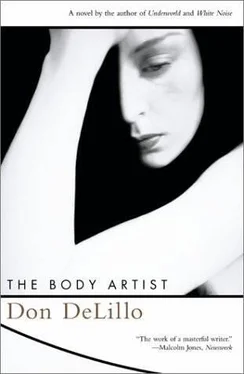Don DeLillo - The Body Artist
Здесь есть возможность читать онлайн «Don DeLillo - The Body Artist» весь текст электронной книги совершенно бесплатно (целиком полную версию без сокращений). В некоторых случаях можно слушать аудио, скачать через торрент в формате fb2 и присутствует краткое содержание. Жанр: Современная проза, на английском языке. Описание произведения, (предисловие) а так же отзывы посетителей доступны на портале библиотеки ЛибКат.
- Название:The Body Artist
- Автор:
- Жанр:
- Год:неизвестен
- ISBN:нет данных
- Рейтинг книги:3 / 5. Голосов: 1
-
Избранное:Добавить в избранное
- Отзывы:
-
Ваша оценка:
The Body Artist: краткое содержание, описание и аннотация
Предлагаем к чтению аннотацию, описание, краткое содержание или предисловие (зависит от того, что написал сам автор книги «The Body Artist»). Если вы не нашли необходимую информацию о книге — напишите в комментариях, мы постараемся отыскать её.
Don DeLillo's reputation rests on a series of large-canvas novels, in which he's proven to be the foremost diagnostician of our national psyche. In The Body Artist, however, he sacrifices breadth for depth, narrowing his focus to a single life, a single death. The protagonist is Lauren Hartke, who we see sharing breakfast with her husband, Rey, in the opening pages. This 18-page sequence is a tour de force (albeit a less showy one than the author's initial salvo in Underworld)-an intricate, funny notation of Lauren's consciousness as she pours cereal, peers out the window, and makes idle chat. Rey, alas, will proceed directly from the breakfast table to the home of his former wife, where he'll unceremoniously blow his brains out.
What follows is one of the strangest ghost stories since The Turn of the Screw. And like James's tale, it seems to partake of at least seven kinds of ambiguity, leaving the reader to sort out its riddles. Returning to their summer rental after Rey's funeral, Lauren discovers a strange stowaway living in a spare room: an inarticulate young man, perhaps retarded, who may have been there for weeks. His very presence is hard for her to pin down: "There was something elusive in his aspect, moment to moment, a thinning of physical address." Yet soon this mysterious figure begins to speak in Rey's voice, and her own, playing back entire conversations from the days preceding the suicide. Has Lauren's husband been reincarnated? Or is the man simply an eavesdropping idiot savant, reproducing sentences he'd heard earlier from his concealment?
DeLillo refuses any definitive answer. Instead he lets Lauren steep in her grief and growing puzzlement, and speculates in his own voice about this apparent intersection of past and present, life and death. At times his rhetoric gets away from him, an odd thing for such a superbly controlled writer. "How could such a surplus of vulnerability find itself alone in the world?" he asks, sounding as though he's discussing a sick puppy. And Lauren's performances-for she is the body artist of the title-sound pretty awful, the kind of thing Artaud might have cooked up for an aerobics class. Still, when DeLillo reins in the abstractions and bears down, the results are heartbreaking:
Why shouldn't the death of a person you love bring you into lurid ruin? You don't know how to love the ones you love until they disappear abruptly. Then you understand how thinly distanced from their suffering, how sparing of self you often were, only rarely unguarded of heart, working your networks of give-and-take.
At this stage of his career, a thin book is an adventure for DeLillo. So is his willingness to risk sentimentality, to immerse us in personal rather than national traumas. For all its flaws, then, The Body Artist is a real, raw accomplishment, and a reminder that bigger, even for so capacious an imagination as DeLillo's, isn't always better. -James Marcus
From Publishers Weekly
After 11 novels, DeLillo (Underworld; White Noise) is an acknowledged American master, and a writer who rarely repeats his successes. This slim novella is puzzling, and may prove entirely mystifying to many readers; like all DeLillo's fiction, it offers a vision of contemporary life that expresses itself most clearly in how the story is told. Would you recognize what you had said weeks earlier, if it were the last thing, among other last things, you said to someone you loved and would never see again? That question, posed late in the narrative, helps explain the somewhat aimless and seemingly pointless opening scene, in which a couple gets up, has breakfast, and the man looks for his keys. Next we learn that heDfailed film director Rey Robles, 64Dis dead of a self-inflicted gunshot wound. SheDLauren, a "body artist"Dgoes on living alone in their house along a lonely coast, until she tracks a noise to an unused room on the third floor and to a tiny, misshapen man who repeats back conversations that she and Rey had weeks before. Is Mr. Tuttle, as Lauren calls him, real, possibly an inmate wandered off from a local institution? Or is he a figment of Lauren's grieving imagination? Is thisDas DeLillo playfully slips into Lauren's mind at one pointDthe first case of a human abducting an alien? One way of reading this story is as a novel told backwards, in a kind of time loop: DeLillo keeps hidden until his closing pages Lauren's role as a body artistDand with it, the novel's true narrative intent. DeLillo is always an offbeat and challenging novelist, and this little masterpiece of the storyteller's craft may not be everyone's masterpiece of the storytelling art. But like all DeLillo's strange and unforgettable works, this is one every reader will have to decide on individually.












